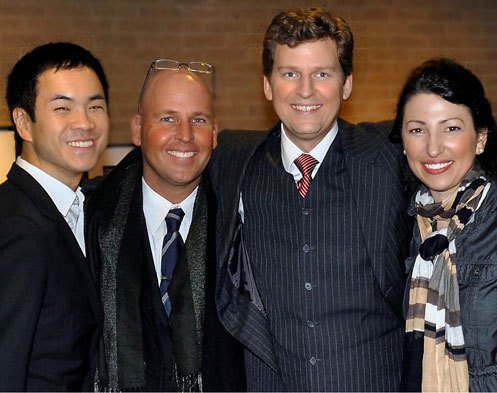
Ehnes string quartet in Miami, incandescent Schubert and Brahms
By Sebastian Spreng, Visual Artist and Classical Music Writer
During a recent Carnegie Hall master class, Marilyn Horne told participants: “Don’t just go to the opera. Be sure to attend recitals, concerts, oratorios… even string quartet performances!” Wise counsel, that of the legendary mezzo-soprano, especially the last one, as was borne out on Monday, Oct. 27, at a packed-to-the-rafters Coral Gables Congregational Church where Miami Friends of Chamber Music kicked off its 2014-15 season. The music made for an incandescent evening, a belated dessert that followed a good weekend and proved to a rapt audience that sometimes the best is indeed saved for last.
Responsible for this sumptuous Schubert-Brahms banquet was the Ehnes String Quartet and the venerable Michael Tree, founder of the renowned Guarnieri Quartet, among others. Led by the illustrious James Ehnes – an international violin star – the quartet that bears his name delivered a phenomenal version of Schubert’s Rosamunde, a brilliant and atypical work replete with allusions to his Lieder that created an atmosphere at once nocturnal, incidental, gallant and rustic, but no less dramatic or disquieting as a result.
Grasping from the very beginning the work’s elusive yet inescapable undertones, the quartet created a mysterious, dreamlike mood that made one wonder what dimensions, unknown to mere mortals, were glimpsed by that young Schubert, who had barely four years to live. That world of questions without answer of Gretchen am Spinnade, as enigmatic as Schöne Welt, wo bist du?, if not more, and its consecutive labyrinths– Schubertian by way of Goethe and his colleagues – was laid out with perfect tragic elegance. Performed almost two centuries after the play’s Vienna debut, this Rosamunde kept its virtues intact. It was pure Schubert.
The evening culminated in another masterful performance by the quartet, joined by Michael Tree. Around the veteran violinist, in his shade, so to speak, the ensemble arranged itself in order to play Brahms’ beloved String Quintet No. 2 in G Major, Opus 111. A compendium of symphonic ideas and rough drafts of those fifth and sixth symphonies that never saw the light of day, it is a noble and mature Brahms piece of the purest stock. In fact, Brahms had decided to stop composing because he believed he had already given the art everything he could. Fortunately, that was not the case. In the torrent of ideas that succeed and accompany each other in the quintet, in the dialogue the composer seemed to be having with himself, as if saying goodbye, you discern a tempestuous painting, with all the colors and possibilities of the Brahmsian palette. The moods are countless, and so much nostalgia and intensity leave you breathless. That intensity and nostalgia, handled with proverbial exquisiteness, bore the hallmark of the five instrumentalists. The ensemble built up a long and steady crescendo that transformed the Viennese atmosphere that had pervaded the entire evening into Hungarian urgency, if you will, with faultless pace and precision. With that magical combination, they again achieved their goal. It was pure Brahms.
A memorable evening for an entity that – judging by the attendance – is gaining new subscribers, a well-deserved consequence of the level of quality it has maintained year after year. The product and its performers again proved the wisdom of the diva’s lighthearted advice: “Be sure to attend…even string quartet performances!”
Recent Content
-
Artsarticle ·
-
Artsarticle ·
-
Artsarticle ·
